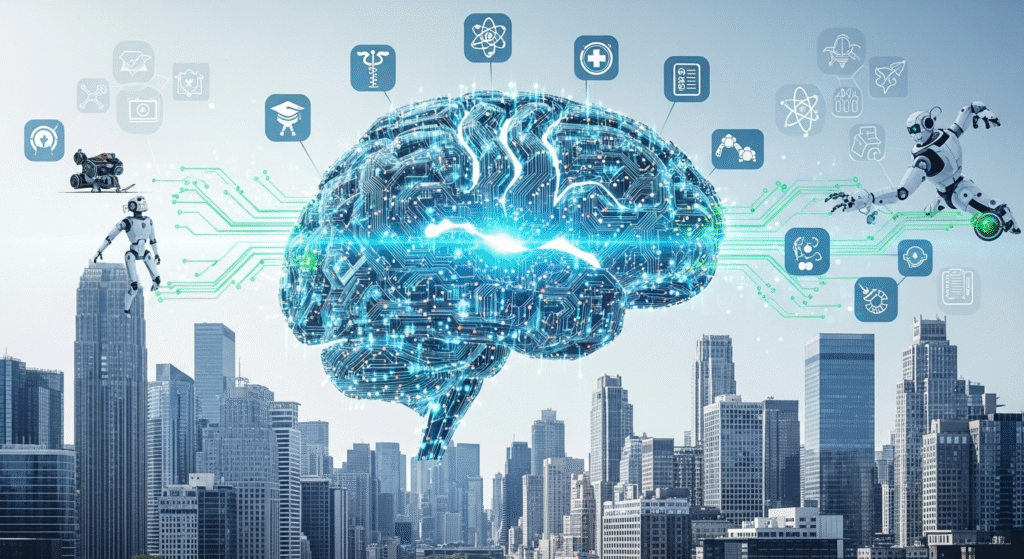In 2025, artificial intelligence (AI) is no longer just a tech trend—it’s the invisible engine running our world. Whether you’re unlocking your phone with face recognition, shopping online, or getting healthcare advice, AI is quietly and efficiently shaping your experience.
This article explores the growing importance of AI in modern life, supported by real-world examples, expert insights, and predictions on how it will evolve further. Let’s unpack why AI is more critical than ever today.
1. AI Is Embedded in Daily Life
We often imagine AI as robots and futuristic machines, but in reality, it’s hidden in apps, devices, and systems we use every day:
- Smartphones: Virtual assistants like Siri and Google Assistant use natural language processing (NLP) to understand commands.
- E-commerce: Amazon and Flipkart recommend products based on AI-powered predictive algorithms.
- Navigation: Google Maps predicts traffic using machine learning.
- Streaming Services: Netflix and Spotify use AI to personalize content suggestions.
AI is the brain behind these conveniences, making life smoother, faster, and more intuitive.
🏥 2. Healthcare Is Getting Smarter with AI
Healthcare is one of the biggest beneficiaries of AI innovation. In 2025, AI is:
- Diagnosing diseases faster than human doctors by analyzing scans and medical histories.
- Predicting outbreaks by studying trends, as seen during COVID-19.
- Powering wearable tech like smartwatches to detect heart conditions early.
In India, AI-driven platforms like Qure.ai are assisting rural healthcare providers in identifying tuberculosis and brain injuries. This democratizes access to advanced diagnostics.
3. Businesses Run on AI Power
From startups to global giants, businesses now use AI to:
- Optimize inventory
- Predict customer behavior
- Automate routine tasks
- Prevent fraud
AI is helping companies cut costs, scale faster, and offer better customer experiences. Tools like ChatGPT, Jasper, and Google Gemini have redefined how marketing, support, and HR tasks are performed.
In fact, many companies now rely on AI-generated content, customer chatbots, and voice assistants to handle 24/7 support and engagement.
4. Education is More Personalized
Imagine a world where a student never falls behind because lessons adapt to their speed. In 2025:
- EdTech platforms like BYJU’S, Khan Academy, and Coursera use AI to personalize learning.
- Teachers use AI-powered tools to grade, create quizzes, and track student progress.
- Language learning apps like Duolingo have AI tutors that simulate real conversations.
AI in education empowers both teachers and students by focusing on individualized learning paths.
5. Sustainability & Climate Solutions
One of AI’s most meaningful uses in 2025 is in combating climate change:
- Energy companies use AI to forecast power demand and reduce waste.
- Agritech startups in India use AI drones to analyze soil quality and crop health.
- AI models are used to predict floods, manage water resources, and map deforestation.
For example, Microsoft’s “AI for Earth” initiative funds dozens of startups working on sustainability using machine learning and computer vision.
6. Cybersecurity Is Powered by AI
With cyber threats increasing every day, manual defense systems can’t keep up. AI is the ultimate line of defense:
- Detects suspicious behavior in real-time.
- Stops malware before it causes damage.
- Monitors entire networks autonomously.
In 2025, banks, hospitals, and even small businesses use AI-powered cybersecurity tools to stay safe.
7. Generative AI Is Transforming Creativity
Platforms like ChatGPT, Midjourney, DALL·E, and Runway ML are enabling anyone to create:
- Written content
- Images
- Videos
- Music
Writers, artists, and creators are now using AI as a creative partner. In fact, many brands use AI-generated ads and social media posts to stay relevant and reduce costs.
Generative AI is not replacing creativity—it’s amplifying it.
8. Artificial Intelligence in Government & Smart Cities
Governments across the globe, including India, are using AI to:
- Track air quality and pollution in real time
- Improve public transport
- Predict crime hotspots
- Automate public grievance handling
In cities like Bengaluru and Delhi, AI is already part of traffic systems and municipal planning.
Smart cities are no longer a concept—they’re being built with AI infrastructure at the core.
9. Artificial Intelligence Challenges & Ethical Concerns
Despite its benefits, AI raises several concerns:
- Job displacement: Automation may replace roles in customer service, data entry, and even legal review.
- Bias in algorithms: If trained on poor data, AI can make unfair decisions.
- Privacy issues: AI systems collect and analyze massive amounts of user data.
That’s why 2025 sees a strong push for AI ethics, regulations, and transparency—to ensure the technology serves humanity.
10. India’s Role in the Artificial Intelligence Boom
India is emerging as a global AI powerhouse:
- The government launched the National AI Portal and is investing in AI research centers.
- Startups like CropIn, SigTuple, and ai are solving real-world problems with AI.
- India’s booming tech talent pool is working with giants like Google, Amazon, and Infosys to build AI solutions used worldwide.
With low-code tools and affordable APIs, AI is now accessible to even small businesses and college students in India.
| Area | Statistic (2025) |
| AI market size | $500 billion globally |
| Indian AI investments | $12 billion+ |
| Jobs impacted | Over 300 million roles augmented or reshaped |
| ChatGPT use cases | 100M+ users globally |
| AI tools in business | Used by 9 out of 10 global companies |
Final Thoughts: Why AI Is a Need, Not a Luxury
In 2025, AI is not just an option—it’s a necessity. Whether it’s:
- Enhancing life-saving healthcare
- Improving education
- Boosting productivity
- Fighting climate change
…AI is deeply integrated into every layer of modern life.
The question is no longer “Should we use AI?”
It’s “How can we use it better, ethically, and inclusively?”
As we move forward, the goal must be to use AI responsibly, ensuring it complements humanity—not replaces it.
Read More: Effects of AI on the Brain: Is ChatGPT Replacing Human Thinking?
